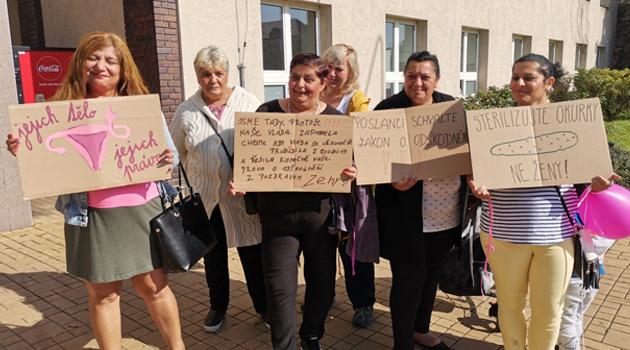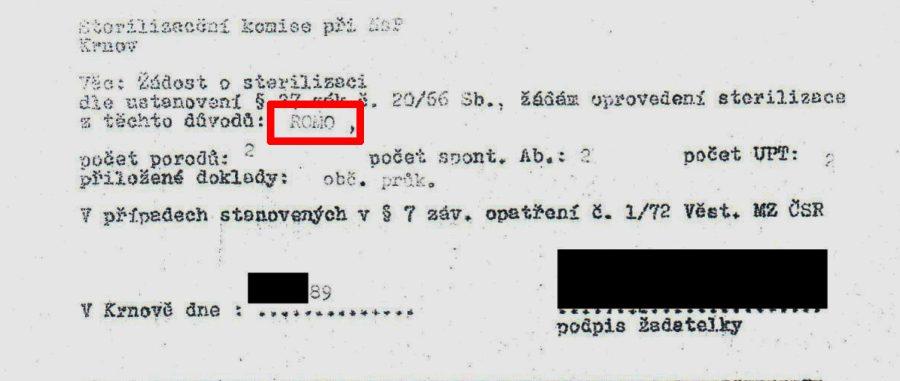Czech Health Ministry scandalously rejects compensation to woman whose Romani origin is listed as the reason for her sterilization

The Czech Health Ministry has rejected a request for compensation in a case of sterilization where the Romani origin of the woman was listed as the reason for the operation. The Human Rights League (Liga lidských práv) organization announced the news today in a press release.
As of 1 January, a law to provide a one-time monetary payment to persons who have been sterilized unlawfully has been in effect. From the beginning of the process, however, those applying for compensation have run into problems.
In August, nonprofit organizations warned about some of those problems through an open letter addressed to the Czech Prime Minister and Health Minister. “None of those problems has been resolved yet. The Health Ministry, despite the two-month deadline, still has several unresolved applications dating as far back as January, and evidence other than medical records is not being recognized,” the Human Rights League says in a press release.
Authorities threatened to take Romani woman’s children into state care
The organization is now warning of the most recent decision from the Health Ministry in which it has failed to award compensation to an applicant whose Romani origin was even explicitly listed as the reason for her sterilization. The woman was threatened that if she did not undergo the surgery, her children would be taken away from her and placed in an orphanage.
This particular applicant was sterilized in 1989. “After I gave birth to my second child, the social worker announced to me that unless I underwent sterilization she would put my children in an orphanage. That scared me terribly, I was quite afraid of losing my children, I can’t even put into words my psychological state at that time. I was clueless, so I agreed because I couldn’t even imagine losing my children,” the Romani woman wrote in application for compensation.
The Czech Health Ministry, according to documents published by the Human Rights League, argued that the woman requested her sterilization. The ministry is absolutely ignoring her description of having been threatened with the removal of her children unless she underwent the procedure.
“No evidence was presented of the alleged psychological pressure to undergo sterilization,” the Czech Health Ministry has literally stated in its scandalous decision. The ministry even made this decision despite the nature of an assessment of the case produced by its own Department of Health Care, from which the ministry has requested assistance in some cases.
“In our opinion, it is not possible to list medical reasons for sterilization. At the same time, it is not permissible to list the applicant’s Romani origin as the reason for her sterilization. The medical records lack any mention of the applicant having been informed of the meaning and repercussions of the medical performance of sterilization,” the Department of Health Care responded.
Human Rights League: The racial reason shows this sterilization was unlawful
According to the Human Rights League, the racial reason listed for the sterilization in and of itself shows the sterilization was unlawful. After all, this context is also stated in the explanatory report to the law, which mentions the eugenic nature of this state policy.

“Another aim, however, was to arrange for a ‘better-quality population’, as can be seen from the reports of the district-level National Committees that disbursed the benefit [to those undergoing sterilization]. From this fact, the eugenic nature of this practice can irrefutably be deduced, which aimed to limit the number of children born in some groups in the population who were perceived by the then-regime to be inadaptable, problematic or undesirable, whether that was the Romani population, as the findings of the Public Defender of Rights indicate, or whether that be persons living with mental or other disabilities, or persons with a larger number of children,” the explanatory report states.
The adoption of the compensation law was a long struggle that took more than 18 years. International bodies appealed to the Czech Republic to compensate the victims.
“Currently, now that this law exists, the Health Ministry is making decisions that violate its purpose,” the Human Rights League writes in their press release. “Such a decision, assessing a sterilization for which Romani origin was listed as the reason to have been a lawful sterilization, unfortunately directly breaches the purpose of the compensation law,” said former Deputy Public Defender of Rights and current civil society member of the Czech Government Human Rights Council, Monika Šimůnková.
Ministry delays, forced sterilization victims die
According to the Human Rights League, many victims of these illegal sterilizations are concerned that they will not live to see their compensation decided because the ministry keeps delaying their cases. “Unfortunately, one of our clients who fought for years for the rights of the victims of illegal sterilizations, Vlasta Cicková, has also passed away. If the decision on her case had been issued within the established timeframe, she would have lived to see it. Hers is not the only death among the victims to have happened during this last year,” the Human Rights League stated.
According to the Human Rights League, the Czech Health Ministry is also not responding to the legal arguments submitted with the application in more than one case. “In these applications we are frequently arguing on the basis of the case-law of the European Court of Human Rights, the basis of discrimination, the nature and requirements of informed consent, the mandatory process established by the decree on sterilizations, or on the basis of good morals, for example. All of these arguments remain ignored in the decisions made by the Health Ministry, which does not even mention them,” the Human Rights League writes in its press release.